Institute Benjamenta, or This Dream People Call Human Life Blu-ray Movie
HomeInstitute Benjamenta, or This Dream People Call Human Life Blu-ray Movie 
Blu-ray + DVDBFI Video | 1995 | 104 min | Rated BBFC: 12 | May 24, 2010
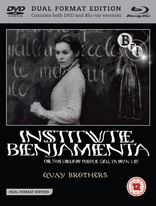
Movie rating
7.4 | / 10 |
Blu-ray rating
| Users | 4.8 | |
| Reviewer | 4.0 | |
| Overall | 4.2 |
Overview
Institute Benjamenta, or This Dream People Call Human Life (1995)
Jakob von Gunten arrives at the Institute Benjamenta, a training school for domestic service, to enroll for its course--a single endlessly repeated lesson. He develops an unresolved and unarticulated attraction to the principal's beautiful wife, while attempting to penetrate the physical and mystical aspects of the Benjamenta's school.
Starring: Mark Rylance, Alice Krige, Gottfried John, Daniel Smith (IX)Director: Stephen Quay, Timothy Quay, Weiser Quay
| Drama | Uncertain |
| Fantasy | Uncertain |
Specifications
Video
Video codec: MPEG-4 AVC
Video resolution: 1080p
Aspect ratio: 1.67:1
Original aspect ratio: 1.66:1
Audio
English: DTS-HD Master Audio 2.0
Subtitles
English SDH
Discs
50GB Blu-ray Disc
Two-disc set (1 BD, 1 DVD)
DVD copy
Playback
Region free
Review
Rating summary
| Movie | 4.0 | |
| Video | 4.0 | |
| Audio | 4.0 | |
| Extras | 4.0 | |
| Overall | 4.0 |
Institute Benjamenta, or This Dream People Call Human Life Blu-ray Movie Review
Reviewed by Dr. Svet Atanasov May 18, 2010The Quay Bros' "Institute Benjamenta, or This Dream People Call Human Life" (1995) arrives on Blu-ray courtesy of the British Film Institute. The supplemental features on the disc include the documentary feature "Inside the Institute: an in-between world"; the Quay Bros' shorts "The Comb" (1990), "Songs for Dead Children" (2003), and "Eurydice - She, so Beloved" (2007); and theatrical trailer. The disc also arrives with a 26-page illustrated booklet. In English and German, with optional English SDH subtitles for the main feature. Region-Free.
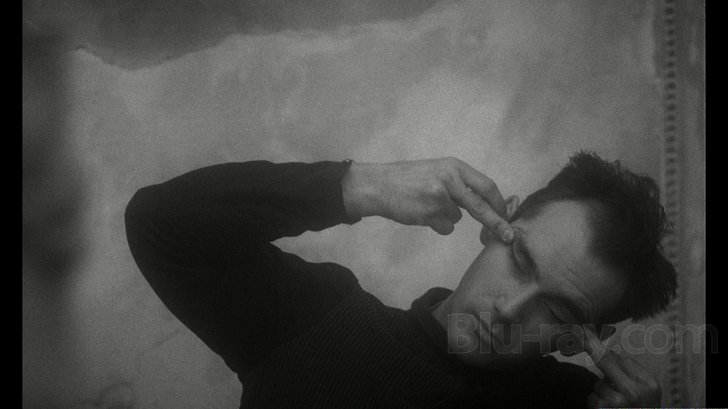
Mark Rylance as Jakob von Gunten
Jakob von Gunten is a young man who does not know what to make of life – which is why he decides to enroll in the mysterious Institute Benjamenta where he would be taught to be good a servant. Upon arrival at the Institute, he is asked a series of questions about his background and personal life and then introduced to his classmates – strange looking men with strange names.
Classes begin but Jacob has a difficult time following his teacher, Fraulein Benjamenta, which is why he starts asking questions. The more he asks, however, the less he understands; there must be something that clearly explains everything that is happening around him - but what, and where is it? Determined to find out, Jakob begins exploring the Institute, opening doors that should not be opened, and entering rooms that should not be entered.
Fraulein Benjamenta quickly notices that Jakob isn’t like the rest of the wannabe servants. Instead of being focused on his "studies", Jakob is disorganized, spending more time thinking than he should. Surprised but intrigued, Fraulein Benjamenta decides to treat Jakob with a special gift - she teaches him how to feel; first she touches him, then he touches her.
The rest of the students immediately notice that Fraulein Benjamenta has changed. At the same time, Herr Benjamenta reveals to Jacob that he is planning to close the Institute because he no longer has the desire to teach. Then, suddenly, Fraulein Benjamenta commits suicide. After the funeral, Herr Benjamenta offers Jakob to join him and leave the cruel world they share forever.
Institute Benjamenta, or This Dream People Call Human Life was the Quay Bros' first full-feature film. It was inspired by Swiss writer Robert Walser’s short novel "Jakob von Gunten", which was first published in the beginning of the century, in Germany.
The film is practically impossible to describe with simple words; first, because it lacks a conventional narrative, and second, because it is something of a visual experiment, more or less reflecting Walser's literary style - a unique mixture of fantasy and realism.
The main protagonist's attempts to deconstruct Fraulein Benjamenta's lessons, as well as his classmates' behavior, however, are easier to apprehend. After he begins exploring the Institute, he gradually begins to realize - and so do we - that the lessons are inspired by a system of values and ideals that is designed to irreversibly damage one’s ability to think independently. He questions it, and surprisingly gets rewarded by Fraulein Benjamenta for his curiosity with an intimate experience, which causes leads to her death, and consequently the closing of the Institute.
Fraulein Benjamenta's tragic death also incites a series of fascinating speculations about the meaning of life, the nature of death, and the strange bond between the two. Some of the speculations deliver effective jabs at conventional religion; others effectively link it to corporate worshiping.
Institute Benjamenta is shot in dreamy black and white, evoking the mood and aesthetics of German expressionism. The careful use of light, in particular, is very effective.
The acting is excellent across the board. Mark Reynods is superb as the perplexed but determined to complete his studies Jakob; Alice Krige is also outstanding as the longing for true love Lisa Benjamenta; and Gottfried John delivers a powerful performance as the uncompromising headmaster Herr Benjamenta. The film is also complimented by a fittingly moody music score courtesy Polish composer Lech Jankowski.
Note: In 1995, Institute Benjamenta was nominated for Golden Leopard award at the Locarno International Film Festival. The film also won a Special Mention award.
Institute Benjamenta, or This Dream People Call Human Life Blu-ray Movie, Video Quality 
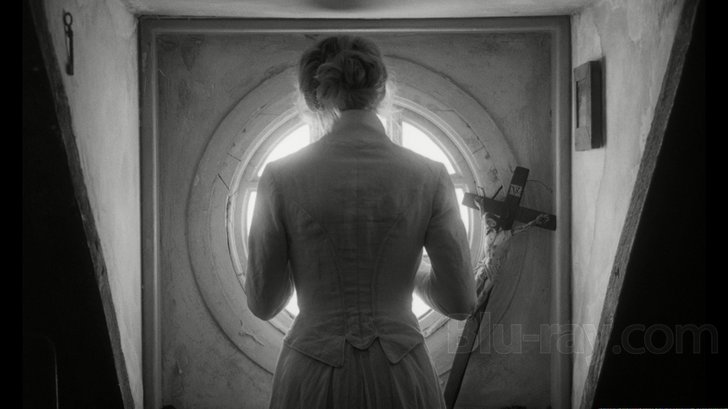
Presented in its original aspect ratio of 1.66:1, encoded with MPEG-4 AVC and granted a 1080p transfer, the Quay's Institute Benjamenta, or This Dream People Call Human Life arrives on Blu-ray courtesy of the British Film Institute (BFI).
This is a very strong high-definition transfer. Fine object detail is pleasing, clarity good and contrast levels convincing. The film's unique color-scheme, however, appears to have benefited the most from the upgrade to 1080p - there are a variety of different blacks, grays and whites that are very effective. Edge-enhancement and macroblocking are not a serious issue of concern. I also did not see any signs of excessive noise reduction; on the contrary, there is plenty of healthy film grain. There are no serious stability issues to report in this review either. Blown through a digital projector, the film looks lovely. Finally, I also did not detect any large cuts, splices, marks, or stains to report in this review. All in all, this is a wonderful presentation of an exceptionally beautiful film. (Note: This is a Region-Free Blu-ray disc. Therefore, you will be able to play it in your PS3 or SA regardless of your geographical location. Please note that there is no problematic PAL or 1080/50i content preceding the disc's main menu).
Institute Benjamenta, or This Dream People Call Human Life Blu-ray Movie, Audio Quality 
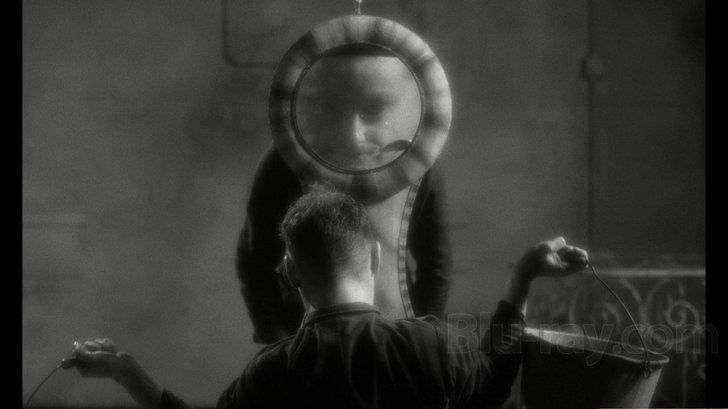
There is only one audio track on this Blu-ray disc: English DTS-HD Master Audio 2.0. For the record, the BFI have provided optional English SDH subtitles for the main feature.
The English DTS-HD Master Audio 2.0 track is very effective, even though its dynamic amplitude is fairly limited. The numerous ambient effects throughout the film are now a lot more prominent (on the R1 SDVD they were either extremely difficult to hear or simply lost in the background noise). Lech Jankowski's unique music score also shines. The dialog is crisp, clean and very easy to follow. Finally, I did not detect any disturbing pops, cracks or excessive hissings to report in this review. The English translation is excellent.
Institute Benjamenta, or This Dream People Call Human Life Blu-ray Movie, Special Features and Extras 
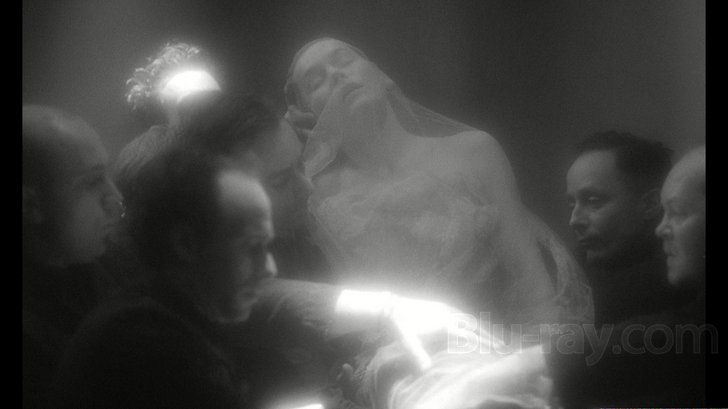
Note: All of the supplemental features on this disc are in 1080p. Therefore, they are perfectly playable on Region-A PS3s and SAs.
Inside the Institute: an in-between world - the Quay Bros, Swiss writer Alan Passes, Alice Krige, Mark Rylance, and other tech crew members recall how Institute Benjamenta came to exist, its complex narrative and message, the idea of light as a character, the unique sounds heard in the film, etc. In English, not subtitled. (31 min, 1080p).
Trailer - the trailer for the film. (2 min, 1080p).
The Comb - an avant-garde animated short that paved the way for the Quay Bros' first feature film. Shot in 1990. In English, not subtitled. (19 min, 1080p).
Songs for Dead Children - an experimental animated short by the Quay Bros and Steve Martland. Shot in 2003. In English, not subtitled. (25 min, 1080p).
Eurydice - She, so Beloved - film ballet in homage to the 400th anniversary of Claudio Monteverdi's Orfeo. Directed by the Quay Bros. Shot in 2007. Not subtitled. (12 min, 1080p).
Booklet - a 26-page illustrated booklet containing Samuel Frederick's essay "Redemption of the Miniature: The Quay Brothers and Robert Walser"; Michael Brooke's "The World of The Quay Brothers"; a letter from producer Keith Griffiths to the Quay Brothers;
Keith Griffiths biography; composer Lech Jankowski's "Notes on the Music"; and Jill Furmanovsky biography.
Institute Benjamenta, or This Dream People Call Human Life Blu-ray Movie, Overall Score and Recommendation 
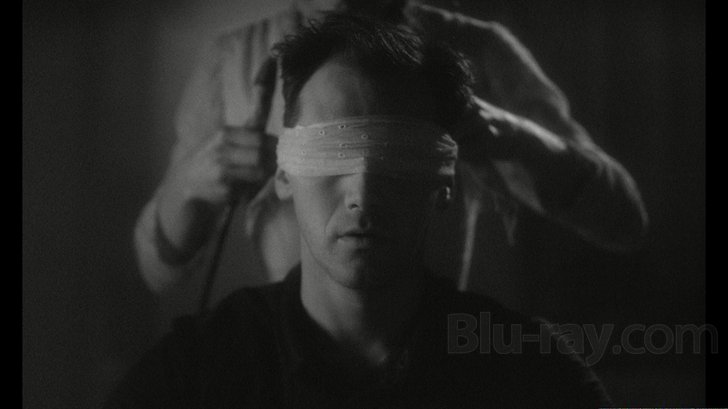
A bold film of exceptional beauty, the Quay Bros' Institute Benjamenta has received a wonderful treatment by the British Film Institute. As far as I am concerned, this is the Blu-ray release of the month. Don't miss it, folks! VERY HIGHLY RECOMMENDED.
Similar titles
Similar titles you might also like

The Trip
1967

Faust
Faust - Eine deutsche Volkssage / Masters of Cinema
1926

Faust
2011

Despair
1978

Wings of Desire
Der Himmel über Berlin
1987

Days of Being Wild
Ah fei zing zyun
1990

Medea
1969

Happy Together
Chun gwong cha sit
1997

Berlin Alexanderplatz
Limited Edition
1980

After Life
ワンダフルライフ / Wandafuru raifu
1998

The Wild One
Indicator Series
1953

Lilya 4-ever
2002

Dreams 4K
夢 / Yume / Akira Kurosawa's Dreams
1990

Bay of Angels
La baie des anges
1963

Wendy and Lucy
2008

Distant
Uzak
2002

The Night Porter
Il portiere di notte
1974

Utamaro and His Five Women
Utamaro o meguru gonin no onna
1946

Passages
2023

Underground
1928